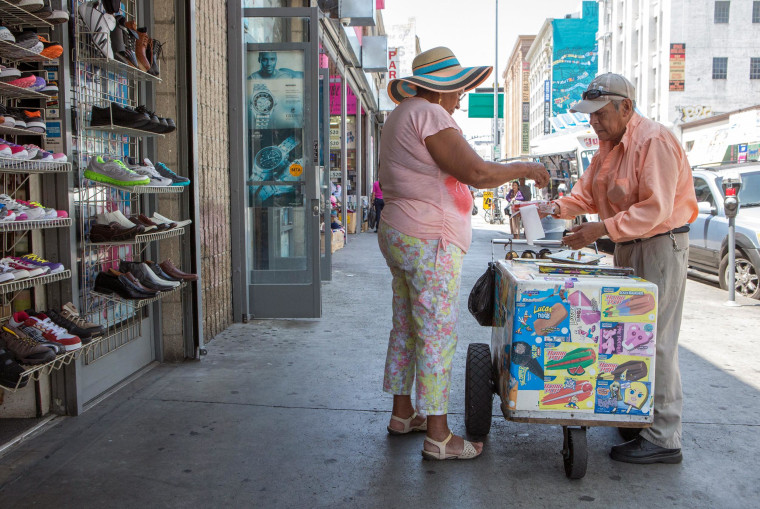LOS ANGELES—Ricardo Perez pushed his ice cream cart up Van Nuys Avenue on a recent near 100-degree afternoon, his brow dropping with sweat. After seven straight 9-hour workdays, Perez pulled in about $400 in profits. The 72-year-old assumes he’ll keep working as a paletero forever.
“I spend what I make on rent and food,” Perez says in Spanish, sitting at a metal picnic table near the downtown courthouse where he rolls his cart. “If I stop working, if I take a break, I’ll die.”
It may not be much of an exaggeration. Perez is part of a growing population of elderly undocumented immigrants in the United States who have no access to Social Security, Medicare, food stamps, subsidized housing or other public programs that hold deep poverty at bay for millions of senior citizens.
According to conservative estimates from the Pew Research Center, in 2011 there were 850,000 undocumented immigrants over the age of 55; 150,000 were over 65. That’s a relatively small portion of the 11 million undocumented immigrants in the U.S., but experts say the numbers of elderly without legal immigration papers are poised to grow rapidly as they follow the Baby Boom generation into retirement age. And they are likely to be among our society’s most impoverished people.
Because undocumented immigrants of all ages are twice as likely as the general population to live in poverty, elderly immigrants without papers are less likely to have amassed savings. To survive, many of these seniors are left with little choice but to keep working low-wage, often physically demanding jobs—street vending, cleaning houses or working as home caregivers—for the rest of their lives.
Lawmakers and others who oppose the passage of proposals that could help poor immigrants like Perez often argue that they are a drain on American taxpayers by using public services without paying their share. But Stephen Goss, the chief actuary for the Social Security Administration, says “in the case of Social Security trust funds, and analogously the Medicare trust funds, our estimates refute that idea.” Most immigrants pay taxes, including the half of unauthorized workers who pay into Social Security, according to recent Social Security Administration analysis.

The agency estimates that in 2010 alone, unauthorized workers injected $12 billion in excess tax revenue into the Social Security fund. Research has found similar trends for Medicare.
Perez has usually paid income taxes, and some years, when he has a steady job, he’s had Social Security payroll taxes taken from his earnings, he said. He holds a Social Security number, which he says he applied for and received in the mid-80’s before the federal government began actively stopping unauthorized immigrants from requesting the numbers. Other undocumented immigrants use false Social Security numbers, often from deceased Americans, in order to work and pay taxes. Still others contribute above ground. Since 1996, unauthorized immigrants have been able to file taxes using an IRS-issued Individual Taxpayer Identification Number, which functions like a Social Security number, to pay taxes.
"I hope I could get benefits for all the years I worked.”
Under current law, these workers are not eligible to receive the benefits they help fund. The immigration reform bill stalled on Capitol Hill offers potential relief by allowing undocumented immigrants who have contributed to Social Security to draw down benefits at retirement age, but not for a decade after applying for legal status—by then, Perez will be in his 80s.
Still, he holds out hope that someday, he’ll qualify for benefits. “I came to the U.S. because the economy in Mexico was the same as it is here now: no work, no food, no nothing,” Perez says. When he arrived in 1985, he was just a few years too late to be eligible for the last immigration legalization, passed by Congress nearly 30 years ago. “Now, I am waiting for immigration reform to pass. It would legalize me, and I hope I could get benefits for all the years I worked.”
Not everyone facing Perez’s predicament feels so hopeful. Nina, 74, a home caregiver in Los Angeles who asked to be referred to by nickname only, has worked and paid income and payroll taxes for most of the nearly 14 years she’s lived in the United States. “I’m totally transparent about my work,” she says about the approximately $30,000 she earns each year often working six-day weeks on shifts that can last as long as 16 hours.
Nina finds jobs through a private homecare company, and her work often includes inserting feeding tubes and catheters for clients, bathing them, and lifting them into bed.
Sometimes, she says, employers are outright exploitative. Nina was recently hired to care round-the-clock for an 80-year old woman who told her that she would have to spend nights sleeping on the floor in the living room. After putting her client to bed after the 11 p.m. news, Nina walked the dog. Then after sleeping for six hours on the carpet, she woke to help her client start her day. Nina was paid $100 a day, about $5.50 for each waking hour, $2.50 below the hourly minimum wage in California.
“I think I’ll be doing this forever,” Nina says in clear English she learned when she lived in the Philippines.
Research by University of Southern California academics found that an inability to retire was among the biggest concern for Filipino elder caregivers. Though many caregivers are left out of the payroll tax requirement on employers, regardless of their immigration status, Nina says she voluntarily paid self-employment taxes as an independent contractor. “When you live somewhere you need to pay taxes there, wherever you live,” she said. “I tell all my friends that.” But as long as she remains undocumented, she can never benefit directly from the taxes she’s paid. She’s regularly reminded of her exclusion by the fact that many of the elderly men and women she cares for use their monthly Social Security dollars to hire her.
“It’s an ironic situation,” says Aquilina Soriano, executive director of the Filipino Workers center, a nonprofit labor group in Los Angeles that organizes homecare workers. “They do this work but they can never receive the same assistance, even though many are the same age.” Soriano says the majority of her group’s members are undocumented immigrants over the age of 50, including some in their 80s who work providing services to people not much older than themselves.
“What happens if I can’t work? I will get to 80, 85, and then what?"
For undocumented elderly who face their golden years unable to retire, returning to their native countries is not always an option. In fact, social services providers and community organizers say that increasingly, undocumented aging workers are deciding to stay in the United States rather than return to their countries of birth. Some immigrants say they intended to return, but that now that they have been here for decades and their communities and families are here, there would be little waiting for them if they left. Many add they’d like to depart, but not without the right to return.
“The immigration system is broken and people are not going back to their countries,” says Antonio Bernabe, a senior organizer with the group Coalition for Humane Immigrant Rights Los Angeles. “They are getting into their 60s and 70’s, plus, and they don’t have a retirement, no Social Security, so they just keep working.”
Many elderly immigrants lack family who can financially support them—many of their younger relatives are often undocumented and low-income themselves—and some rely on other aging undocumented immigrants, or act as caretakers themselves for their elderly undocumented friends and relatives.
Julio Carranza, 66, is the sole provider for himself and his disabled wife. He has lived in the U.S. since 1989 and sells ice cream from a cart, a job he’s done since he was forced to leave the textile factory where he worked sewing pants and shirts when his eyesight began to deteriorate.
On the $300 Carranza makes each week, he supports himself and his wife, who he met working in the factory, but who is now disabled and struggles to move on her own. They live together in a garage he rents for $150 a month. There’s no bathroom in the garage, nor a stove or refrigerator. And there’s no ramp for his wife to use, so he has to carry her up and down the steps. Because she’s undocumented, she receives no disability insurance. He gets no Social Security benefits.
“There’s just not money,” Carranza says. “I worked and saved and saved, and thought I’d retire, or work less. But life does not go as planned.”
On a recent Wednesday at 1 p.m., Carranza’s wife called him on his cell phone as he stood on the busy side walk behind his cart to make sure he’d eaten lunch that day. Every day he tells his wife he’s eaten lunch, but most days he skips it.
Like many elderly undocumented immigrants, Carranza says he’s waiting for immigration reform. Yet even if it went into effect today, he’d be 76 before he could any Social Security, assuming he could prove that he paid into the system for the ten years required to be eligible.
“We should have something, some benefit, something to help us,” Carranza says.
Like Carranza, Ricardo Perez, the 72-year-old paletero, is nearly alone in the U.S. His only family in Los Angeles, his son, was deported to Mexico several years ago after he was pulled over by police for driving without a license.
Perez says he worries pretty much every day about what will happen to him.
“How will I end my life?” Perez says. “What happens if I can’t work? I will get to 80, 85, and then what? I’d like to live with more security. It’s hard, thinking about how I will die, without anything to help me.”
